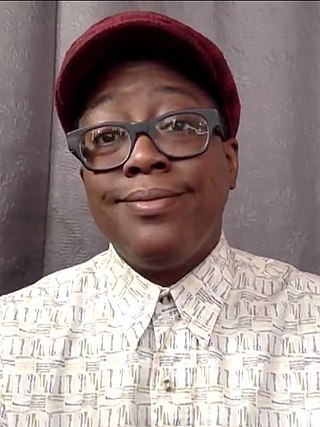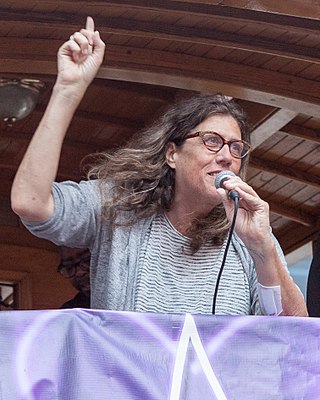Related Research Articles
Heteronormativity is the concept that heterosexuality is the preferred or normal mode of sexual orientation. It assumes the gender binary and that sexual and marital relations are most fitting between people of opposite sex.
"New queer cinema" is a term first coined by the academic B. Ruby Rich in Sight & Sound magazine in 1992 to define and describe a movement in queer-themed independent filmmaking in the early 1990s.

LGBT stereotypes are stereotypes about lesbian, gay, bisexual and transgender (LGBT) people are based on their sexual orientations, gender identities, or gender expressions. Stereotypical perceptions may be acquired through interactions with parents, teachers, peers and mass media, or, more generally, through a lack of firsthand familiarity, resulting in an increased reliance on generalizations.

TransGeneration is a US documentary-style reality television series that affords a view into the lives of four transgender college students during the 2004–2005 academic year. Two of the students are trans women, and two are trans men. Each of them attends a different school in the United States, and they are each at a different stage of their degree programs. The filmmakers document events in the students' academic careers, their social and family lives, and their transitions.
Rose Troche is an American film and television director, television producer, and screenwriter.
Sheila Jeffreys is a former professor of political science at the University of Melbourne, born in England. A lesbian feminist scholar, she analyses the history and politics of human sexuality.

Cheryl Dunye is a Liberian-American film director, producer, screenwriter, editor and actress. Dunye's work often concerns themes of race, sexuality, and gender, particularly issues relating to black lesbians. She is known as the first out black lesbian to ever direct a feature film with her 1996 film The Watermelon Woman. She runs the production company Jingletown Films based in Oakland, California.

Lesbian, gay, bisexual, and transgender (LGBT) people in Pakistan face legal and social difficulties compared to non-LGBT persons. Pakistani law prescribes criminal penalties for same-sex sexual acts. The Pakistani Penal Code of 1860, originally developed under the British Raj, criminalises sodomy with possible penalties of prison sentences from two years to a life sentence and fines. Despite its illegality, homosexual acts are only occasionally prosecuted by authorities in Pakistan. Other morality and public order provisions in the Penal Code are however used to target LGBT Pakistanis.
Historically, the portrayal of lesbian, gay, bisexual, and transgender (LGBT) people in media has been largely negative if not altogether absent, reflecting a general cultural intolerance of LGBT individuals; however, from the 1990s to present day, there has been an increase in the positive depictions of LGBT people, issues, and concerns within mainstream media in North America. The LGBT communities have taken an increasingly proactive stand in defining their own culture, with a primary goal of achieving an affirmative visibility in mainstream media. The positive portrayal or increased presence of the LGBT communities in media has served to increase acceptance and support for LGBT communities, establish LGBT communities as a norm, and provide information on the topic.
This is a timeline of notable events in the history of the lesbian, gay, bisexual and transgender (LGBT) community in the United Kingdom. There is evidence that LGBT activity in the United Kingdom existed as far back as the days of Celtic Britain.

Susan O'Neal Stryker is an American professor, historian, author, filmmaker, and theorist whose work focuses on gender and human sexuality. She is a professor of Gender and Women's Studies, former director of the Institute for LGBT Studies, and founder of the Transgender Studies Initiative at the University of Arizona, and is currently on leave while holding an appointment as Barbara Lee Distinguished Chair in Women's Leadership at Mills College. Stryker serves on the Advisory Council of METI and the Advisory Board of the Digital Transgender Archive. Stryker, who is a transgender woman, is the author of several books about LGBT history and culture. She is a leading scholar of transgender history.

Gen Silent is a 2010 documentary film, directed and produced by Stu Maddux. The documentary follows the lives of six LGBT seniors living in the Boston area who must choose if they will hide their sexuality in order to survive in the long-term health care system. It has been screened at numerous colleges and universities as well as in front of government agencies and healthcare organizations. It premiered at the Boston LGBT Film Festival and has won numerous awards at others.

My Transsexual Summer is a British documentary-style reality series about seven transgender people in different stages of transition. For five weekends in the summer of 2011, they stay together in a large holiday home in Bedfordshire, where they meet and help each other with some of the struggles that transgender people face. Between these weekend retreats, they go back to their lives and real-world challenges.
Despite the history of colonisation and the resulting process of Westernisation since 1842, Hong Kong still embodies many aspects of Chinese traditional values towards sexuality. It is traditionally believed that heterosexuality is the nature, coherent, and privileged sexuality. Popular media marginalises and discriminates against LGBT members of Hong Kong in an attempt to maintain "traditional lifestyles".

The following outline offers an overview and guide to LGBT topics.
Banana is a 2015 British television series created by Russell T Davies and aired on E4. The sister series to Channel 4's Cucumber and the 4oD documentary series Tofu, Banana is a series focusing on LGBT youth in Manchester, around the narrative of Cucumber. Unlike Cucumber, which is a self-contained serial following the story of one gay man, Banana is an anthology series focusing on the wider LGBT spectrum. The series was nominated for the GLAAD Media Award for Outstanding TV Movie or Limited Series.
Honey Lee Cottrell was a lesbian photographer and filmmaker who lived most of her life in San Francisco, California. Her papers are part of the Human Sexuality Collection at Cornell University Library.

The African-American LGBT community, otherwise referred to as the Black American LGBT community, is part of the overall LGBT culture and overall African-American culture. The initialism LGBT stands for lesbian, gay, bisexual, and transgender.
Naz and Matt Foundation is a charity based in the United Kingdom that tackles homophobia triggered by religious and cultural beliefs.
Queer art, also known as LGBT+ art or queer aesthetics, broadly refers to modern and contemporary visual art practices that draw on lesbian, gay, bisexual, transgender, and various non-heterosexual, non-cisgender imagery and issues. While by definition there can be no singular "queer art", contemporary artists who identify their practices as queer often call upon "utopian and dystopian alternatives to the ordinary, adopt outlaw stances, embrace criminality and opacity, and forge unprecedented kinships and relationships." Queer art is also occasionally very much about sex and the embracing of unauthorised desires.
References
- 1 2 3 4 Taylor, Linda. (1989). Crossing Over for Good. The Statesman and Society.
- 1 2 3 4 5 6 7 8 Southbank Centre (11 March 2015), WOW 2015 | Maybe She's Born With It - full session , retrieved 2 November 2016
- 1 2 3 4 5 "New Mentor: Kristiene Clarke - Warnborough Worldwide". Warnborough Worldwide. 28 May 2015. Retrieved 3 November 2016.
- ↑ "Kristiene Clarke | Director/Producer | The Talent Manager". www.thetalentmanager.co.uk. Retrieved 2 November 2016.
- 1 2 Murray, Raymond (1994). Images in the dark: an encyclopedia of gay and lesbian film and video. TLA Publications.
- ↑ Bornstein, Kate (2010). Gender outlaws: The next generation. Seal Press. p. 13.
- 1 2 "26th San Francisco International Lesbian & Gay Film Festival". issuu. Retrieved 3 November 2016.
- 1 2 "Docfest 2011 | Aldeburgh Cinema". www.aldeburghcinema.co.uk. Archived from the original on 10 November 2016. Retrieved 3 November 2016.
- 1 2 3 Elley, Derek (10 March 1994). "Review: 'Sandra Bernhard: Confession of a Pretty Lady'". Variety. Retrieved 17 November 2016.
- ↑ Murray, Raymond (1988). Images in the Dark: An Encyclopedia of Gay and Lesbian Film and Video. London: Titan Books. p. 166.
- 1 2 3 "Film, Television and Media Studies - UEA". www.uea.ac.uk. Retrieved 3 November 2016.